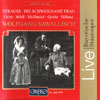R Strauss Die Schweigsame Frau
This production, taken from the Bavarian Radio archives, although cut, conveys all the liveliness of its 1971 Munich premiere
View record and artist detailsRecord and Artist Details
Composer or Director: Richard Strauss
Genre:
Opera
Label: Orfeo d'or
Magazine Review Date: 1/2000
Media Format: CD or Download
Media Runtime: 126
Mastering:
ADD
Catalogue Number: C516992I

Tracks:
| Composition | Artist Credit |
|---|---|
| (Die) Schweigsame Frau, '(The) Silent Woman' |
Richard Strauss, Composer
Albrecht Peter, Morbio, Tenor Barry McDaniel, Barber, Tenor Bavarian State Opera Chorus Bavarian State Opera Orchestra Benno Kusche, Vanuzzi, Baritone Donald Grobe, Henry Morosus, Tenor Glenys Loulis, Carlotta Kurt Böhme, Sir Morosus, Baritone Lotte Schädle, Isotta, Soprano Martha Mödl, Housekeeper, Soprano Max Proebstl, Farfallo, Baritone Reri Grist, Aminta, Soprano Richard Strauss, Composer Wolfgang Sawallisch, Conductor |
Author: Alan Blyth
That ardent and devoted Straussian, William Mann, slated this production (in Opera) when he saw it at its premiere in Munich in 1971 because the score was 'cut to ribbons', declaring that it was therefore, in Strauss's home city, 'a national disgrace'. The following year the Bavarian State Opera visited Covent Garden when I saw and hugely enjoyed, as did many, Gunther Rennert's delightfully mercurial but seldom exaggerated staging in Rudolf Heinrich's evocative sets, not missing (perhaps even noticing, I can't recall) the excluded passages. The score was in fact foreshortened even more than when Rennert staged the work in 1959, Karl Bohm in the pit, a performance now available on DG as above, and much appreciated by me when it appeared here five years ago in the Strauss/Bohm Edition.
All the liveliness and spirit of the Munich event is conveyed in this recording from the archives of Bavarian Radio to the extent that you hear a lot of stage noises. Sawallisch wholly enters into the spirit of the Ben Jonson comedy as adapted for his libretto by Stefan Zweig. The cast, excellent all round, easily get their collective tongues around the profusion of words. Kurt Bohme, near the end of his long career, is, as he was in the flesh, a magnificently rotund Morosus, with real 'face' in his singing and possessing all the bass notes that Hotter (DG) and Adam (on the absolutely complete EMI version) don't quite possess, being bass-baritones.
The then-young American singers, all of whom spent most of their careers in Germany, cast as Aminta, Henry and the Barber, all possess good German. Grist is a delightfully fresh and pleasing Aminta and Barry McDaniel (who, I see, has just bade farewell to the stage in Stuttgart) an inventive Barber, though his rivals on the other sets, Prey (DG) and Schone (EMI) are even better. As Henry, Grobe isn't quite the equal of DG's Wunderlich - who can be? Modl enjoys herself hugely as the Housekeeper: at Covent Garden, I remember, she launched the show with huge aplomb, putting everyone in the right mood for the piece.
Sawallisch, in 1971 newly appointed Music Director in Munich and destined to do so much there for the cause of Strauss, manages to keep clear all the many strands in Strauss's score; so do Bohm and Janowski. This version, in stereo, has that advantage over the DG, but the singing on the latter is, by a small margin, superior. If you want every note you must have Janowski - three CDs, but at mid-price.'
All the liveliness and spirit of the Munich event is conveyed in this recording from the archives of Bavarian Radio to the extent that you hear a lot of stage noises. Sawallisch wholly enters into the spirit of the Ben Jonson comedy as adapted for his libretto by Stefan Zweig. The cast, excellent all round, easily get their collective tongues around the profusion of words. Kurt Bohme, near the end of his long career, is, as he was in the flesh, a magnificently rotund Morosus, with real 'face' in his singing and possessing all the bass notes that Hotter (DG) and Adam (on the absolutely complete EMI version) don't quite possess, being bass-baritones.
The then-young American singers, all of whom spent most of their careers in Germany, cast as Aminta, Henry and the Barber, all possess good German. Grist is a delightfully fresh and pleasing Aminta and Barry McDaniel (who, I see, has just bade farewell to the stage in Stuttgart) an inventive Barber, though his rivals on the other sets, Prey (DG) and Schone (EMI) are even better. As Henry, Grobe isn't quite the equal of DG's Wunderlich - who can be? Modl enjoys herself hugely as the Housekeeper: at Covent Garden, I remember, she launched the show with huge aplomb, putting everyone in the right mood for the piece.
Sawallisch, in 1971 newly appointed Music Director in Munich and destined to do so much there for the cause of Strauss, manages to keep clear all the many strands in Strauss's score; so do Bohm and Janowski. This version, in stereo, has that advantage over the DG, but the singing on the latter is, by a small margin, superior. If you want every note you must have Janowski - three CDs, but at mid-price.'
Discover the world's largest classical music catalogue with Presto Music.

Gramophone Digital Club
- Digital Edition
- Digital Archive
- Reviews Database
- Full website access
From £8.75 / month
Subscribe
Gramophone Full Club
- Print Edition
- Digital Edition
- Digital Archive
- Reviews Database
- Full website access
From £11.00 / month
Subscribe
If you are a library, university or other organisation that would be interested in an institutional subscription to Gramophone please click here for further information.




